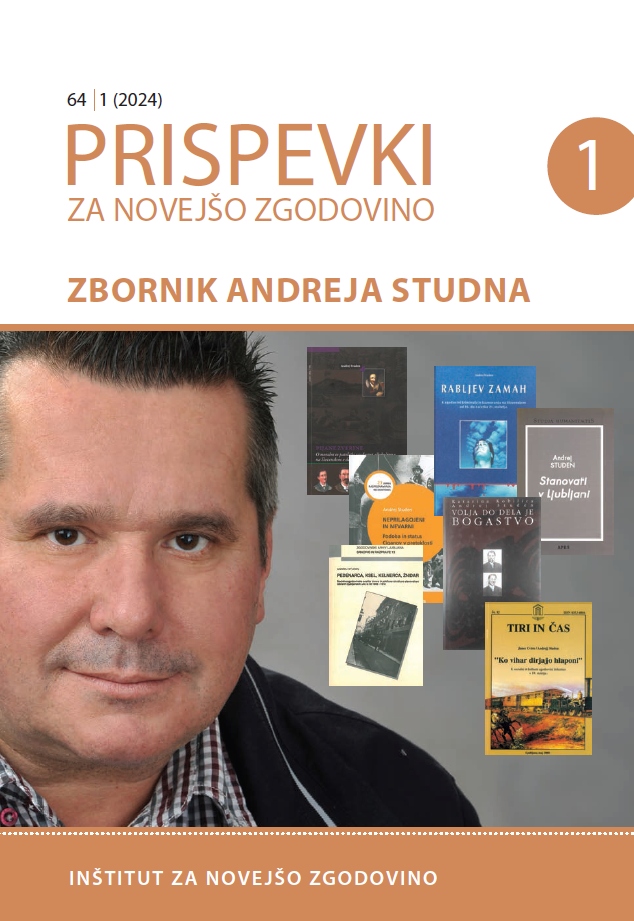Surviving in the Trenches and the Hinterland: Between Deprivation And Punishment
DOI:
https://doi.org/10.51663/pnz.64.1.19Keywords:
World War I, Isonzo Front, trenches, hinterland, militarisation, memoryAbstract
World War I was not only traumatic for the soldiers in the trenches but also for civilians who experienced labour mobilisation, war attrition, deprivation, and hunger in the hinterland. After encountering the topography of the trenches and the survival strategies that determined everyday life during the war, a completely new, previously unknown world of perceptions involving new hierarchies, rules, and vocabulary was created. Concepts like the “total” mobilisation and militarisation of society illustrate the impact of the war on human relations and reasoning. War Propaganda Offices shaped the image of the enemies and encouraged the search for internal opponents. In the hinterland, many people’s rights were abolished or diminished through a series of measures. The Military Court was given jurisdiction over the civilians. After the armistice, masses of soldiers returned home, and together with the civilian population, they started cleaning up the ruins that were not only material.
References
Arnejc, Fran. Od Dnestra do Piave. Celovec: Družba Sv. Mohorja, 1970.
Bajt, Anton. Kanal ob Soči. V dnevniku občinskega tajnika Antona Bajta. Kromberk: Goriški muzej, 2006.
Barbusse, Henri. Ogenj. Dnevnik desetnije. Ljubljana: Tiskovna zadruga, 1921.
Bonač, Fran. Noči groze. V: Bojevnik, Spomini vojnih veteranov prve svetovne vojne. Ljubljana: Karantanija, 2014.
Emden, Richard. Humphries, Steve. All Quiet on the Home Front, An Oral History of Life in Britain during the First World War. South Yorkshire: Pen & Sword Military, 2017.
Klavora, Marko. Soška fronta v kolektivnem spominu zgornjega Posočja. V: Marko Štepec (ur.). Take vojne si nismo predstavljali. Ljubljana: Muzej novejše zgodovine Slovenije, 2014.
Lah, Andrijan. Velika vojna. Evropsko romanopisje o 1. svetovni vojni v slovenskih prevodih. Ljubljana: Forum 7, 2020.
Matičič, Ivan. Na krvavih poljanah. Trpljenje in strahote z bojnih pohodov bivšega slovenskega planinskega polka. Ljubljana: Učiteljska tiskarna, 1922.
Milčinski, Fran, Dnevnik 1914–1920. Ur. Goran Schmidt. Ljubljana: Slovenska matica, 2000.
Mole, Vojeslav. Tristia ex Siberia. Ljubljana: Nova založba: 1920.
Palmer, Svetlana. Wallis, Sarah. A War in Words, The First World War in Diaries and Letters. London: Simon & Schuster Ltd, 2003.
Pivkova, Ljudmila. Avstrijske ječe. V: Ljudevit Pivko. Proti Avstriji 1914–1918. Maribor: Založba Obzorja, 1991.
Pölzer, Hans. Trije dnevi pekla na Soči. Ljubljana: Karantanija, 2011.
Remarque, Erich Maria. Na zahodu nič novega. Ljubljana: Delo, 2005.
Robida, Ivan. Spomini na Suhi Bajar l. 1915/16. Kronika slovenskih mest 2, 1935, št.1.
Rumiz, Paolo. Kot konji, ki spijo stoje. Ljubljana: Modrijan, 2016.
Schrödinger, Erwin. Vojni dnevnik 1915. Šempeter pri Gorici: Založba Univerze v Novi Gorici, 2018.
Simončič, Maks, Galicija. Spomini padlega vojaka. Ljubljana : [s. n.], 1935.
Stergar, Rok. Politični cilji slovenske inteligence. Nekaj drobcev o vohunih in vojakih. Zgodovina za vse 5, št. 1 (1998): 21–29.
Stergar, Rok. Slovenci in Italijani v času prve svetovne vojne. V: Peter Vodopivec in Katja Kleindienst (ur.). Velika vojna in Slovenci. Ljubljana: Slovenska matica, 2005.
Stibbe, Mathew. German Anglophobia and the Great War 1914–1918. Cambridge: Cambridge University Press, 2006.
Studen, Andrej. »Nespodobno oblečene ženske so satanovo orodje, ker po njih, kakor nekdaj po kači govori«. V: Stiplovškov zbornik, 89–102. Ljubljana: Oddelek za zgodovino Filozofske fakultete, 2005.
Šimac, Miha in Katarina Keber. Patriae ac Humanitati. Ljubljana: Zgodovinski inštitut Milka Kosa ZRC SAZU, 2011.
Štepec, Marko. The Heritage of the Soča Front and Collective Memory. V: Uroš Košir, Matija Črešnar in Dimitrij Mlekuž (ur.). Rediscovering the Great, Archeology and Wenduring Legacies on the Soča and Eastern Fronts, 214–33. Routledge, 2019.
Tuma, Henrik. Izza velike vojne. Nova Gorica: Branko 1994.
Vilfan, Igor. Predgovor. V: Franc Rueh. Moj dnevnik 1915–1918, 7–8. Ljubljana: Slovenska matica, 1999.
Witkop, Philipp (ur.). German Students` War Letters. University of Pennsylvania Press, 2002.
Downloads
Published
Issue
Section
License
Copyright (c) 2024 Marko Štepec

This work is licensed under a Creative Commons Attribution 4.0 International License.
Authors who publish with this journal agree to the following terms:
- Authors retain copyright and grant the journal right of first publication with the work simultaneously licensed under a Creative Commons Attribution License that allows others to share the work with an acknowledgement of the work's authorship and initial publication in this journal.
- Authors are able to enter into separate, additional contractual arrangements for the non-exclusive distribution of the journal's published version of the work (e.g., post it to an institutional repository or publish it in a book), with an acknowledgement of its initial publication in this journal.
- Authors are permitted and encouraged to post their work online (e.g., in institutional repositories or on their website) prior to and during the submission process, as it can lead to productive exchanges, as well as earlier and greater citation of published work (See The Effect of Open Access).


